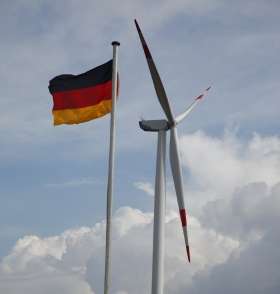BERLIN (Bloomberg) -- BMW Group will harness winds whipping across eastern Germany to secure power -- and defend profits -- as costs rise due to Germany's 550 billion-euro ($740 billion) shift away from nuclear energy.

Four wind turbine towers will soon supply almost a quarter of the power used at BMW's Leipzig plant, where the carmaker builds the X1 SUV and soon the i3, its first electric car.
Daimler AG is firing up a power plant at a truck factory and Volkswagen AG is mulling at least five new generators. The reason: The German auto industry is seeking to sidestep the effects of a plan by Chancellor Angela Merkel to shut nuclear reactors and boost renewable energy, which has led to higher taxes on power bought from commercial producers.
"Every second German industrial producer either generates its own power or is considering doing so because of Merkel's energy switch," said Sebastian Bolay, an energy policy analyst at DIHK, a manufacturers trade group in Berlin. "Generating your own power is not only cheaper in most cases, it could also protect you from grid failures."
A 47 percent hike in a clean-energy surcharge this year could add as much as 254 million euros to the combined power bills of auto manufacturers and parts suppliers in Germany.
Since 2006, the surcharge has risen sixfold. BMW, VW and Mercedes-Benz parent Daimler are under pressure to control costs as auto demand in Europe heads for its sixth consecutive annual decline this year after 2012 sales dropped to their lowest level in almost two decades. Weak demand compounds the strain of high labor and energy rates.
Wide price range
Power for large manufacturers in Germany averaged 10.4 euro cents per kilowatt-hour last year, according to the country's Economy Ministry. That compares with 7.25 euro cents in France, where PSA/Peugeot-Citroen makes the DS line that challenges BMW, and 6.76 euro cents in Romania, the base of Renault's budget Dacia brand.
In the United States, a surge in domestic natural gas production has pushed industrial power prices to as low as 2 euro cents to 3 euro cents a kilowatt-hour, according to Michael Schmidt, CEO of BP's European subsidiary.
Germany is paying for the shift from nuclear -- which the government estimates will cost 550 billion euros for plants and grid upgrades -- in part by raising taxes on power. A renewable-energy surcharge rose on Jan. 1 to 5.28 euro cents per kilowatt-hour from 3.59 euro cents last year and 0.88 euro cents in 2006.
Massive user
The German auto industry purchases about 15 terawatt-hours, or 15 billion kilowatt-hours, of electricity annually, according to the trade group VDA. That means the surcharge alone will cost carmakers and suppliers as much as 792 million euros this year.
"While we've welcomed the energy switch, we also need competitive power prices and a stable supply," said VDA spokesman Eckehart Rotter.
The energy switch risks creating shortages in Germany's industrial south -- home to Daimler and BMW -- which has already lost about 5 gigawatts of reactor capacity, according to state-owned researcher Dena Energy Agency.
Merkel in October backed a plan to prevent utilities such as EON and RWE from closing unprofitable conventional plants to guarantee supply.
Merkel's plan, proposed after the disaster at Japan's Fukushima plant in the wake of the 2011 tsunami, relies on expanded use of wind and solar. Those technologies only produce power when weather conditions are right --increasing the risk of outages.
Making their own
That has spurred auto companies to investment in their own generators. Daimler this year plans to open a 17 million-euro gas-fired plant to supply power and heat at its truck factory in the western city of Woerth.
The company says the plant reduces energy costs about 26 percent and carbon-dioxide emissions 15 percent versus its previous supply deal.
Volkswagen, whose German facilities consume more power than Jamaica, this year will inaugurate a 70-megawatt gas-fired station at a component plant in Kassel.
Europe's largest carmaker may add at least five more generators in coming years, according to Raimund Wunder, the head of power-plant unit Volkswagen Kraftwerk GmbH.
"We're planning to expand our own generation step by step," Wunder said. "This gives us access to a secure energy supply and makes us more independent."
Backed by facilities like a 300-megawatt coal-fired station at its Wolfsburg headquarters, VW already generates 63 percent of the 4.3 terawatt-hours it consumes in Germany annually.
VW also saw a business opportunity in the trend toward energy independence, teaming up with clean-energy company LichtBlick SE to offer an at-home generator that consumers can use to produce their own power.
At BMW's Leipzig plant, the four 2.5-megawatt turbines from Nordex SE will eventually generate about 26 gigawatt-hours of electricity a year, or about 23 percent of the plant's total consumption, said Jury Witschnig, head of sustainability strategy at the Munich-based manufacturer.
The automaker seeks to eventually get all its power from renewables, compared with 28 percent in 2011 -- both to cut its carbon output and benefit from falling prices for wind and solar energy. "There will definitely be more such projects" from renewable sources, Witschnig said. "Energy prices are part of the business case," and in Leipzig wind power was cheaper than other options.
